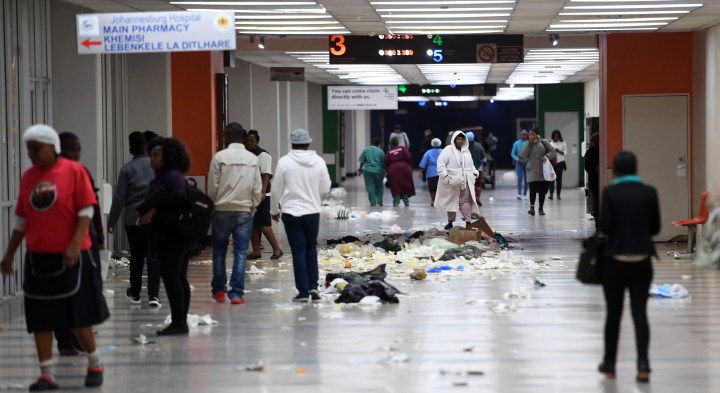OP-ED
The ANC is neither willing nor capable of delivering universal healthcare

The opinion piece by Busani Ngcaweni is misplaced, inaccurate and at best wishful thinking.
In an opinion piece, Busani Ngcaweni contends that the National Health Insurance (NHI) is a cure-all to all South Africa’s health needs while the reality is that the public healthcare system is on life support.
While the goals of providing universal healthcare are important it is clear that the ANC government lacks the political will and capacity to deliver it. Plans by the Minister of Health, Dr Aaron Motsoaledi, to push ahead with the National Health Insurance are an act of desperation and form part of the ANC’s electioneering tactics. It is a decision doomed to failure from the outset.
The NHI proposal has never been properly costed with Motsoaledi admitting that he had no idea how much it would cost or where the money would come from. Meanwhile, NHI pilot projects have failed abysmally wherever they have been trialled.
What Ngcaweni fails to mention is the backdoor dealings of Motsoaledi following the introduction of the NHI Bill. It was reported that Motsoaledi had made substantive changes to the Bill and presented a new version to Cabinet without consulting with National Treasury or senior members of his own department. Instead, reports suggest that the changes are the brainchild of Motsoaledi and presidential adviser Dr Olive Shisana.
The Minister made substantive changes to the existing Bill that effectively kill the private healthcare system. This includes restricting medical aid or other private health insurance schemes to providing only complementary cover, effectively making NHI the only game in town. The effect of this is nothing short of nationalising the private healthcare industry by making the State the sole purchaser of healthcare services. The Minister did not take any input from the public seriously, as the proposed changes are substantive, and the public and other stakeholders have not had an opportunity to raise their concerns.
The proposed creation of a single National Health Insurance Fund is little more than the creation of another enormous state-owned entity (SOE). This is greatly concerning considering the government’s dismal performance in managing SOEs, endemic corruption and its equally dismal performance in providing healthcare. Much like government’s failed management of Eskom, South Africa will surely be heading towards a healthcare “blackout” if NHI is fully implemented.
The Minister is completely out of touch with the crisis in the South African public health system, and this was highlighted by his denial of the ongoing health crisis.
DA visits to hospitals and clinics around the country have exposed medicinal shortages, equipment shortages and a severe shortage of beds. In most hospitals visited, infrastructure is collapsing and lack of maintenance in facilities is painfully obvious. Doctors are leaving the public health sector in droves. They cannot work under the present conditions with lack of resources, very long hours due to lack of effective personnel and maladministration at every level. While the Western Cape has 33 specialists per 100,000 residents, Limpopo only has 1.3 specialists per 100,000. The MEC of Health in Limpopo stated: “If people are one day sick and require a specialist, they will wish they were born in the Western Cape.”
The current and revised NHI Bill fails to address the real crisis in the health sector.
First, it cannot be implemented due to failure in the current health sectors which cannot deliver effective healthcare to the majority of South Africans.
Second, the Minister himself cannot tell us what the costs of implementing the Bill will be and advises that it will take up to 15 years to effectively implement. The provinces cannot manage current budgets and have all declared they are under-financed.
Third, the NHI pilot projects have failed abysmally already. If a pilot project is unsuccessful, there is no chance that it will be successful nationally. Lastly, the NHI aims to put a cap on the amount of private health insurance providers and medical aids. This creates a risk of monopoly in the industry, price fixing and collusion.
There is however hope for quality universal healthcare.
After extensive consultation with both academia and the industry, the DA’s offer, titled Our Health Plan – to uplift the health sector and introduce a practical and sustainable health plan – is far more effective. It can be rolled out and put into effect within five to eight years, takes into account the needs of all South Africans and, where put into practice, has proved itself.
Furthermore, Our Health Plan will provide quality healthcare which is affordable and can be implemented using our current health budget. This would mean that medical aid contributions would no longer be tax deductible. The additional revenue would go to reducing the costs of medical aid.
Where the Our Health Plan is implemented in the Western Cape, the province has shown that it can deliver better healthcare than in any other provinces, a fact recognised by the MEC of health in Limpopo. Mortality rates are lower – half of any other province, it has attracted the highest number of South African doctors and has the highest number of specialists per capita. Hospitals and clinics are better maintained and have far better resources.
The Minister aims to rob Peter to pay Paul. The current health system has collapsed and is in the severe financial crisis. It can be fixed but will require proper leadership, less corruption and better management and appropriate use of budgets.
The DA health plan is the only alternative to resuscitate a broken system. DM
Lindy Wilson DA Deputy Shadow Minister of Health.



















 Become an Insider
Become an Insider